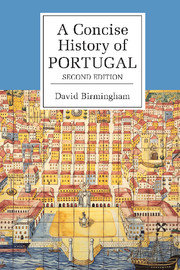Book contents
- Frontmatter
- Dedication
- Contents
- List of illustrations
- Introduction
- 1 Peoples, cultures and colonies
- 2 Rebellion and independence in the seventeenth century
- 3 The golden age and the earthquake in the eighteenth century
- 4 Brazilian independence and the Portuguese Revolution
- 5 The bourgeois monarchy and the republicans
- 6 The dictatorship and the African empire
- 7 Democracy and the European Community
- The houses of Avis, Beja and Habsburg
- The houses of Braganza and Braganza-Saxe-coburg
- Republican presidents
- Select source materials
- Selected works published since 1990
- Further reading in English
- Index
6 - The dictatorship and the African empire
Published online by Cambridge University Press: 05 June 2014
- Frontmatter
- Dedication
- Contents
- List of illustrations
- Introduction
- 1 Peoples, cultures and colonies
- 2 Rebellion and independence in the seventeenth century
- 3 The golden age and the earthquake in the eighteenth century
- 4 Brazilian independence and the Portuguese Revolution
- 5 The bourgeois monarchy and the republicans
- 6 The dictatorship and the African empire
- 7 Democracy and the European Community
- The houses of Avis, Beja and Habsburg
- The houses of Braganza and Braganza-Saxe-coburg
- Republican presidents
- Select source materials
- Selected works published since 1990
- Further reading in English
- Index
Summary
The great depression of 1930 affected Portugal as profoundly as any country in Europe. The external dimension of the economy had hitherto continued to reach two ways, northward to Britain which supplied consumer goods and southward to Brazil which supplied money in the form of savings sent home by emigrants. The depression ended this system of two-way dependency and forced Portugal to become more self-reliant at home and to seek new trading partners abroad. The domestic change involved a severe retrenchment in the scope of government. The liberal reforms of the bourgeois monarchy and of the republic were abandoned and a new autocratic oligarchy gained ascendancy which curtailed workers' rights, restricted expenditure on education and services and repressed political opinions with an increase of police surveillance. Politics were increasingly dominated by a single dictator who satisfied the aspirations of the old-style army officers while distancing them from the practice of politics, Upper middle-class Catholic civilians formed a new generation of politicians who quietly admired the disciplinarian politics of fascist Italy and Nazi Germany. They also looked southward with a view to extracting new wealth from the African empire both as a closed market for wines and textiles and as a cheap source of tropical sugar and cotton. The austerity of the inter-war dictatorship was increased by the outbreak of the Second World War and the further curtailment of seaborne commerce even among neutral nations.
- Type
- Chapter
- Information
- A Concise History of Portugal , pp. 161 - 184Publisher: Cambridge University PressPrint publication year: 2003

